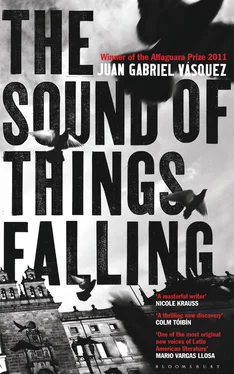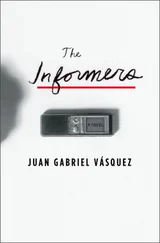‘Ricardo,’ she said with her tongue tangled up. ‘Laverde.’
‘Bad, very bad,’ said Ricardo. ‘But it doesn’t matter, Elena, your mouth looks pretty saying it.’
‘My name’s not Elena,’ said Elaine.
‘I don’t understand, Elena,’ he said. ‘You’re going to have to practise, I’ll help you if you want.’
Ricardo was a couple of years younger than her, but he acted as if he had far more experience of the world. At first they would meet at dusk, when Elaine got back from her classes at the CEUCA, and they’d exchange a few phrases in the sitting room on the second floor, almost under Paco the canary’s cage: How are you, How did you get on, What did you learn today, Say my name three times without getting tongue-tied. ‘Bogotanos are very good at talking without saying anything,’ Elaine wrote to her grandparents. ‘I’m drowning in small talk.’ But one afternoon they met on 7th Avenue, and it struck them as such a remarkable coincidence that they had both just spent the morning shouting slogans outside the US Embassy, calling Nixon a criminal and singing, ‘End it Now, End it Now, End it Now!’
A long time later Elaine would find out that the encounter had not been coincidental in the slightest: Ricardo Laverde had waited for her to come out of the CEUCA and had followed her for hours, spying on her from afar, hiding among the people on the street and behind the signs saying Calley = Murderer and Proud To Be A Draft Dodger and Why Are We There, Anyway? and soaking up all the songs a couple of metres behind the spot Elaine had stationed herself, while rehearsing different versions, various intonations, of the words he eventually said to her: ‘Well now, this is a coincidence, isn’t it? Come on, let me buy you a drink, and you can tell me all your complaints about my parents.’
Away from the Laverde house, far from the carefully arranged porcelain and the gaze of a military officer in oils and the canary’s irritating whistle, her relationship with the son of her hosts was transformed or started from scratch. There, sitting with a hot chocolate in her hands, Elaine told him things and listened to what Ricardo told her. So she found out that Ricardo had graduated from a Jesuit-run high school, that he’d started to study Economics — a sort of bequest or imposition of his father’s — and a few months earlier he’d dropped out to pursue the only thing he was actually interested in: flying planes. ‘My father doesn’t like it, of course,’ Ricardo would tell her much later, when they could confess such things to each other. ‘He’s always been resistant. But my grandfather’s on my side. I can count on my grandfather. And Papá can’t do anything. It’s not easy to contradict a war hero. Even if it was just a little war, an amateur war compared to the one that came before and the one that followed in the world, an inter-war war. But anyway, a war is a war and all wars have their heroes, right? The worth of the actor does not depend on the size of the theatre, my grandfather said. And of course, for me it was lucky. My grandfather supported me when it came to planes. When I started to get interested in learning how to fly, my grandfather was the only one who didn’t call me crazy, immature, deranged. He supported me, supported me openly, even confronting my father, and it’s not easy to say no to a hero of the air war. My father tried, that I remember perfectly, but without success. That happened a few years ago, but I remember it as if it were yesterday. Sitting right here, my grandfather where you are, under the cage, my father where I am. My grandfather passing a hand over Dad’s scar on his face and telling him not to make me catch his fears. A lot of time would have to pass before I understood all the cruelty that gesture contained, a tired old man, although he didn’t seem so, patting the face of a strong young man, although he didn’t seem so. Not just that, of course, but the scar as well, the fact that it was the scar that received the pats. . You’ll say that it would be quite difficult to pat my father’s face without touching his scar in some way, and yes, that may be, and more so because my grandfather was right-handed. And of course, the pats of a right hand fall on the left cheek of the person receiving them, on my father’s left cheek, his disfigured cheek.’
The conversation about the origin of the disfigured cheek would come much later, when they were already lovers and the curiosity for each other’s bodies had led to a curiosity for each other’s lives. Neither was surprised when they started having sex, which was like a piece of furniture that had been there the whole time without either of them noticing. Every night, after dinner, host and guest would keep talking for a while, then they’d say goodnight and climb the stairs together, and when they got to the second floor Elaine went to the end of the hall and into the bathroom, locked the door and minutes later came back out in a white nightgown and with her hair tied up in a long ponytail. One rainy Friday night — the water was crashing against the skylight and drowning out any other noises — Elaine came out of the bathroom as she always did, but, instead of finding the corridor dark and the glow of the streetlights shining through the skylights of the interior patio, she saw the silhouette of Ricardo Laverde leaning against the banister. Against the light she couldn’t see his face very well, but Elaine read the desire in his pose and in his tone of voice.
‘Are you going to sleep?’ Ricardo asked.
‘Not yet,’ she said. ‘Come in and tell me about planes.’
It was cold, the wood of the bed creaked with every single movement of their bodies, and also it was a little girl’s bed, too narrow and short for these games, so Elaine ended up pulling off the bedspread with one tug and spreading it out on top of the carpet, beside her felt slippers. There, on the woollen bedspread, freezing to death, they had a quick and to-the-point encounter. Elaine thought her breasts seemed smaller in Ricardo Laverde’s hands, but she didn’t tell him that. She put her nightgown back on to go out to the bathroom, and there, sitting on the toilet, thought she’d give Ricardo time to go back to his own room. She also thought she’d enjoyed being with him, that she’d do it again if the occasion arose, and that what had just happened must be forbidden in the statutes of the Peace Corps. She washed in the bidet, looked in the mirror and smiled, turned off the bathroom light before opening the door, and returning to her bedroom in the dark, walking slowly so she wouldn’t trip, she found that Ricardo had not left, but had rather remade the bed and was waiting for her there, lying on his side, resting on his elbow, leaning his head on his hand like the leading man of some terrible Hollywood movie.
‘I want to sleep alone,’ said Elaine.
‘I don’t want to sleep, I want to talk,’ he said.
‘OK,’ she said. ‘And what shall we talk about?’
‘Whatever you want, Elena Fritts. You suggest a topic and I’ll follow.’
They talked about everything except themselves. They were naked and Ricardo let his hand wander over Elaine’s belly, his fingers through her straight hair, and they talked of intentions and projects, convinced, as only new lovers can be, that saying what you wanted was the same as saying who you were. Elaine talked about her mission in the world, about youth as a weapon of progress, of the obligation to confront worldly powers. And she asked Ricardo questions: Did he like being Colombian? Would he like to live in another part of the world? Did he hate the United States? Had he read any of the New Journalists? But it took another seven couplings over the next two weeks before Elaine dared to ask the question that had intrigued her since the first day: ‘What happened to your father’s face?’ ‘How prudent the señorita is,’ said Ricardo. ‘It’s never taken anybody so long to ask me that question.’ They were going up to Monserrate in the cable car when Elaine asked: Ricardo had waited for her to come out of the CEUCA and told her it was time for some tourism, that a person couldn’t come to Colombia just to work, that she should stop behaving like such a Protestant, for the love of God. And now Elaine was holding onto Ricardo (her head glued to his chest, her hands clenched around his elbows) every time a gust of wind shook the cabin on its cable and the tourists all gasped at the same time. And over the course of the afternoon, suspended in the air or sitting in the pews of the church, wandering in circles around the gardens of the sanctuary or seeing Bogotá from an altitude of 3,000 metres, Elaine began to listen to the story of an aerial exhibition in a year as distant as 1938, she heard talk of pilots and acrobatics and of an accident and the half a hundred dead the accident left. And when she woke up the next morning a package was waiting for her next to her recently served breakfast. Elaine tore off the wrapping paper and found a magazine in Spanish with a leather bookmark stuck between the pages. She started to think the bookmark was the gift, but then she opened the magazine and saw the surname of her hosts and a note from Ricardo: So you’ll understand .
Читать дальше












